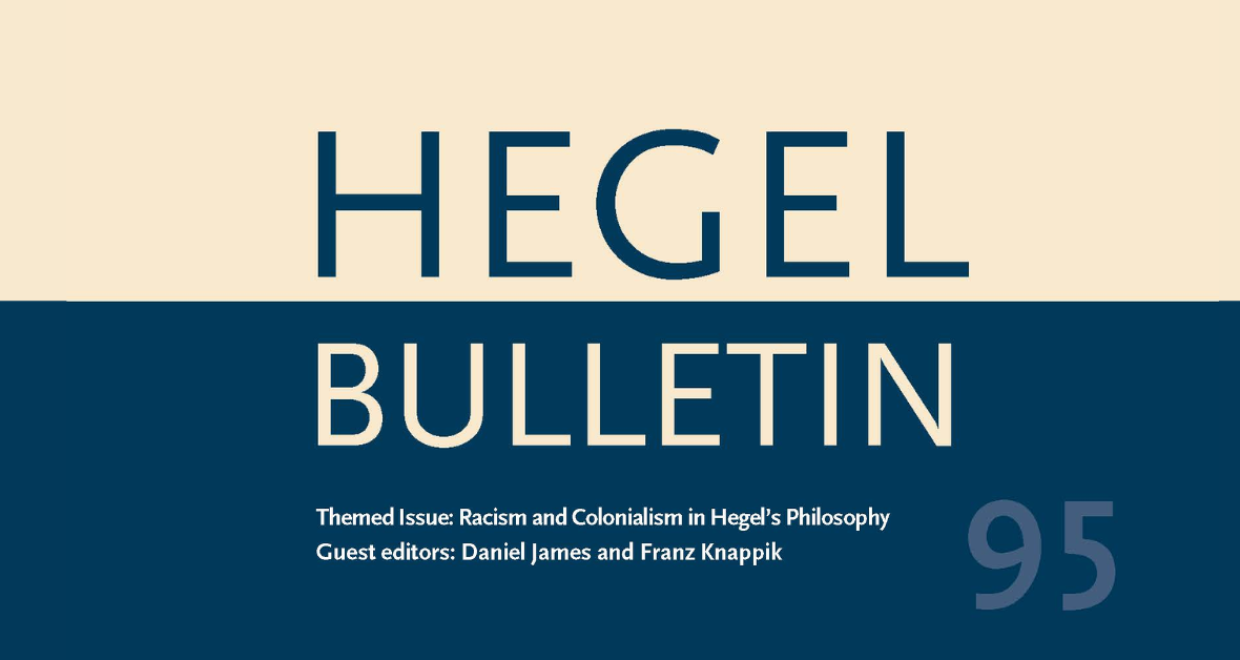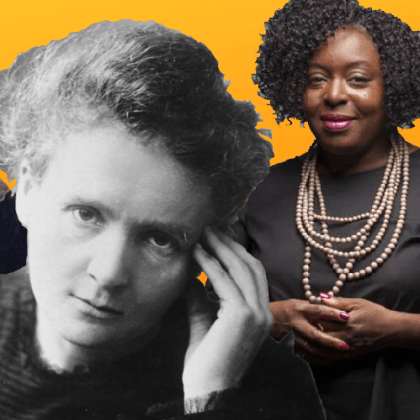Racism and Colonialism in Hegel’s Philosophy:
A Conversation with the Guest Editors of the Hegel Bulletin Themed Issue, Daniel James and Franz Knappik
Q: The first two issues of volume 45 (2024) in the CUP journal Hegel Bulletin are dedicated to the topic “Racism and Colonialism in Hegel’s Philosophy”. Could you tell us a bit about the background and motivation of this themed issue?
Daniel: Both of us had for a while been individually drawn to questions of racism and colonialism. However, like several other recent philosophical projects engaging with these questions, it was the events of 2020—the year of Hegel’s 250th birthday—that brought our collaboration on what would become the topic of the themed issue into sharper focus. In particular, we were struck by a powerful contrast: That year, the BLM protests sparked by the murder of George Floyd and the killings of Breonna Taylor and Elijah McClain spread across many parts of the Western world. These protests led not only to the literal toppling of a statue of Edward Colston, a 17th-century slave trader, in Bristol, but also to heated debates over calls to figuratively topple canonical European philosophers, including Hume and Kant, whose legacies are arguably intertwined with colonialism and racism. However, while those protests also swept over Germany, we did not witness similar debates about the philosopher widely celebrated that year: Hegel. Instead, it seemed that numerous passages in Hegel’s work that struck us as racist or pro-colonial continued to be generously overlooked by most established Hegel scholars—although prominent figures like Robert Bernasconi had been raising concerns about them for over 25 years. When acknowledged at all, these passages were often downplayed as incidental or external to the core of his philosophy. On one occasion, even the very question of whether Hegel’s philosophy might contain elements of racism or pro-colonialism was dismissed as patently absurd—and thus unworthy of philosophical attention. We vehemently disagreed. Accordingly, we saw this as a fitting occasion to initiate what we hoped would become a serious philosophical debate on that question. This themed issue is part of that initiative. As we read through the submissions to our call for papers, we were delighted to see that scholars from different parts of the world shared our interest in exploring the issues that ultimately shaped this collection!
Q: How do the contributions in the themed issue approach the topics of racism and colonialism in Hegel’s philosophy? Are there particular aspects that are common focuses of the papers?
Franz: Yes, there are. Many of the papers are partly or entirely focused on developing new interpretations and critical discussions on Hegel’s views about topics like race (Michael Hardimon), African, Indigenous American and Islamic societies and cultures (Robert Bernasconi, Filipe Campello, Emir Yigit & Zeyad El Nabolsy), slavery (Miikka Jaarte, Leonie Stibor, Ciaran Cross), colonialism (Jamila Mascat, Eduardo Baker), and on racist and Eurocentric elements that underpin various dimensions of his philosophy (W. Ezekiel Goggin, Erick Lima, Christian Hofmann). Some of these contributions examine texts that have become available only recently (Bernasconi), others put Hegel’s thoughts in new or relatively neglected contexts such as colonial debates in the French Revolution (Baker), debates on slaveholder indemnities in Hegel’s time (Cross), Black radical traditions (Cross, Stibor), Latin-American Indigenous thought (Campello), postcolonial thought (Mascat), contemporary critical philosophy of race (Hardimon), philosophy of religion (Goggin) and Muslim philosophy (Yigit & El Nabolsy). Others point to critical potential in Hegel’s thought that is of on-going relevance for the post-colonial condition (Lima, Hofmann).
A second set of papers, which partly overlaps with the first, focuses on Hegel’s legacy, insofar as it pertains to matters of race and colonialism. In some cases, this legacy perpetuates the racist, pro-colonial and pro-slavery elements found in Hegel’s work. Thus, Dave Beisecker & Joseph Ervin show that William Torrey Harris (1835-1909), a member of the so-called St Louis Hegelians and US Commissioner of Education from 1889 till 1906, used a thoroughly Hegelian account of racial hierarchy, historical progress and education towards freedom as the basis for elaborating and implementing the US program of off-reservation ‘American Indian boarding schools’ – a cruel part of colonial history that is today investigated as grave historical injustice.
Relatedly, Jaarte shows that some of the St Louis Hegelians embraced Hegel’s pro-slavery arguments. Viren Murthy examines the work of Japanese scholar and Pan-Asianist Okakura Tenshin (1863-1913), who uses elements of Hegel’s philosophy both to criticize European colonialism and to defend Japanese claims to hegemony in Asia.
In other cases, Hegel’s legacy is unambiguously anti-colonial. Karen Ng examines how Frantz Fanon builds on Hegel to develop a “new humanism” underpinning his critique of racism and colonialism. And Evgenia Ilieva focuses on another Caribbean thinker, C.L.R. James (1901-1989), who used an interpretation of Hegel’s Science of Logic to develop a new account of (esp. anticolonial) revolution.
Q: Many argue that academic philosophy is itself still affected by the legacy of colonialism, with the academic communities of countries in the global North playing an unduly dominant role. To what extent are such issues reflected in your work on this themed issue?
Franz: We took deliberate steps to make this project as accessible as we could to scholars from the global South and from areas outside of the Anglosphere. We published the call for the themed issue in English, French, Spanish, Portuguese, Italian and German, and allowed for submissions of abstracts and papers in all these languages. We then translated these texts into English before or during the review process (a huge thanks to Carlota Salvador Megias for helping us with some of these translations, at a time when ChatGPT was not yet available!). We also organized an intense online workshop for authors, to ensure draft papers were in as good as possible shape prior to submission. We are satisfied with the results: the themed issue brings together contributions from four different continents, and several of the published papers were submitted in languages other than English. This is of course but a drop in the bucket, but we nevertheless think this experience is encouraging. Especially now that generative AI makes the translation job much easier, there seems no good reason why academic journals shouldn’t switch to a multi-language model, where far more scholars can submit, and ideally also publish, in their native languages.
Q: Given all the dark sides of Hegel’s philosophy – his racism, his pro-colonialism, his sexism etc. – should we still read him today?
Daniel: Yes, but in a way that is quite different from how it is usually practised. As noted above, there has been a tendency in Hegelian scholarship to sanitise his philosophy, either by overlooking his seemingly racist or pro-colonialist remarks or by erecting firewalls between them and what is commonly regarded as the core elements of his thought. We should resist this tendency.
Take, for example, what is arguably one of the most influential aspects of Hegel’s thought: the dialectic of lordship and bondage. As Jaarte argues in his contribution, Hegel’s account of the disciplining function of forced labour also underpins his partial justification of transatlantic slavery in the remark to section 57 of the Philosophy of Right. This justification influenced not only the St. Louis Hegelians, but, as Michael Hoffheimer has shown, also Lucius Quintus Cincinnatus Lamar, a Southern delegate, slaveholder and staunch defender of slavery, who cited Hegel’s pro-slavery argument during the US congressional debates on slavery in 1860.
These entanglements—both within Hegel’s philosophy and with those who inherited it—should not be ignored as we engage with his work. If we do, we risk inheriting Hegel’s errors alongside his insights. Indeed, even if we find them troubling, we believe that studying these entanglements is valuable because it reveals how ideas that we still find appealing and that continue to shape our thinking today—such as Hegel’s idea of freedom—may have oppressive implications of which we were previously unaware.
Moreover, these are not the only entanglements worth considering. As Ng and Ilieva’s contributions illustrate, Hegel’s philosophy—and particularly his account of lordship and bondage—has been a major source of inspiration for several anti-colonial, anti-slavery and anti-racist thinkers, many of whom, like Fanon and James, came from formerly colonised or enslaved groups. Especially given the darker sides of Hegel’s thought, we believe that viewing his philosophy through the lens of these thinkers can help illuminate not only its untapped emancipatory potential but also the revisions needed to fully realise it.
Q: Do you plan to engage with debates on racism and pro-colonialism in Hegel also in your future research?
Franz: We have started to develop a new project that looks at these and related debates from a meta-level: how exactly can we spell out the reasons why academic philosophy should relate to its history in a more critical way than has often been the case? What role should be given to an examination of the dark sides of canonical authors, and what functions can be played by new historical narratives and a more inclusive canon?
Daniel: A crucial part of this project is also to reframe such debates through a perspective of collective memory. The history of philosophy is woven into public memory, especially through its presence in school and university curricula, in tributes to historical figures through ceremonial acts, lecture series, or in physical forms such as portraits or statues in philosophy departments and public spaces, or in the naming of squares and buildings. As a part of public memory, the history of philosophy arguably also contributes to our public self-understanding (consider, for example, Germany’s self-image as the ‘Land der Dichter und Denker’ [land of poets and thinkers]). The stories we tell about the history of philosophy and the role of those we consider to be its protagonists hold not only ethical but also political significance. We want to explore two kinds of ethical and political obligations in relation to the history of philosophy: first, those arising from philosophy’s role in the past, such as its involvement in legitimising colonialism; second, those arising from the role of the history of philosophy in the present, such as perpetuating historical narratives that obscure or distort philosophy’s past complicity. A guiding question for us is: How might historians of philosophy reshape public memory—for example, by constructing new historical narratives—to help fulfil these obligations?






